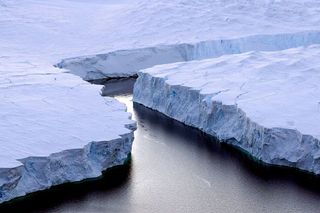
Leading Climate Scientists Call for ‘Declaring a State of Planetary Emergency’
In the past decade, the world has blown past more than half of its climate points-of-no-return, and the effects are accelerating.

A group of leading scientists is calling for “declaring a state of planetary emergency” based on the finding that we have already surpassed more than half of the climate change tipping points identified a decade ago.
The Amazon rainforest and ice sheets in the Antarctic and Greenland are undergoing changes at an unexpectedly rapid rate, the group warns, which raises the possibility of a “cascade” of accelerating and unstoppable climate change.
It’s not just that the steady, measurable burden of human activity on the Earth’s environment has intensified, but that scientific advances have revealed the planet is already “self-amplif[ying]” these manmade effects even at the current 1.1 degrees Celsius of global warming.
This planetary self-amplification is an increasingly documented phenomenon known as “amplifying feedbacks,” or, more confusingly, as “positive climate feedbacks.” A simple example is that of water vapor: “As heat-trapping gases like carbon dioxide are added to the atmosphere, Earth’s surface and atmosphere warm up,” explains Dan Lashoff, director of the World Resources Institute, U.S., for the organization’s blog. “Warmer air holds more water vapor. But water vapor also traps heat, so the extra water vapor in the air amplifies the initial warming.”
Earlier estimates have simply added up all such cascading effects, which Lashoff explains is inaccurate “because they amplify each other and themselves.” Additionally, they could prompt other amplifying feedbacks to kick in earlier than expected, further widening and accelerating the cascade of climate change effects. While Lashoff, in his 2018 post, suggests this amplification of the amplification would primarily play out in the next century, the new paper offers evidence that we no longer can expect that kind of time.
Related on The Swaddle:
All the Arguments You Need: To Convince People That Individual Behavior Does Affect Climate Change
“A decade ago we identified a suite of potential tipping points in the Earth system; now we see evidence that over half of them have been activated,” Tim Lenton, PhD, director of the Global Systems Institute at the University of Exeter and the lead author of the paper published in the journal Nature, said in a statement. “The growing threat of rapid, irreversible changes means it is no longer responsible to wait and see. The situation is urgent, and we need an emergency response.”
In addition to points-of-no-return in Amazon rainforest cover and ice melt in Greenland and the Antarctic, other critical tipping (or rather, tipped) points the group identifies include: Arctic sea ice melt, boreal forest cover, permafrost cover, warm-water coral reef cover, and alteration in the integrated cold-warm water exchange via currents in the Atlantic Ocean — more formally known as Atlantic meridional overturning circulation. All of these come with amplifying feedbacks. For instance, glaciers are reflective, absorbing little heat; as they melt, Lashoff explains, the newly exposed, darker surfaces “reduce the amount of sunlight reflected out to space […] which means there is more energy available to warm the planet, amplifying the initial warming.”
“Scientifically, this provides strong evidence for declaring a state of planetary emergency, to unleash world action that accelerates the path towards a world that can continue evolving on a stable planet,” co-author Johan Rockström, director of the Potsdam Institute for Climate Impact Research, said in the statement.
The paper follows hot on the heels of the latest United Nations Emissions Gap Report, released Tuesday, which characterized its findings as “bleak.” Far from making progress on the Paris Agreement — which was drafted in 2015 and limits greenhouse gas emissions in order to keep global warming under the threshold of the 2-degrees Celsius increase experts agree would prompt devastating changes to the environment — carbon dioxide emissions have risen 11% since the first report in 2011.
“Countries collectively failed to stop the growth in global [greenhouse gas] emissions, meaning that deeper and faster cuts are now required,” the UN report states.
But in the new letter, the scientists warn even deeper and faster cuts may not be enough, given the planet’s own acceleration of manmade changes.
Some cascade effects might be felt sooner than others. A new report on global biodiversity has found that of the planet’s roughly 435,000 unique land plant species, about 40% are already “exceedingly rare” — that is, observed in the wild fewer than five times ever — and at high risk of extinction due to climatic changes and human activity. Biodiversity loss can engender its own ever-speedier amplifying feedback loop, leading to soil degradation that results not only in further biodiversity loss but also diminished capacity to trap carbon — which contributes to further atmospheric heating, which accelerates climate change and biodiversity loss.
“We might already have crossed the threshold for a cascade of inter-related tipping points,” said Lenton, of the Global Systems Institute at the University of Exeter. “However, the rate at which they progress, and therefore the risk they pose, can be reduced by cutting our emissions.”
Liesl Goecker is The Swaddle's managing editor.
Related


Girls’ and Boys’ Brains Function Similarly While Doing Maths, Confirms Study
